|
De Albanese dichter en schrijver Bilal Xhaferri werd geboren op 2 november 1935 in Ninat bij Konispol. Zie ook alle tags voor Bilal Xhaferri op dit blog en ook mijn blog van 2 november 2010
For My Sister Antiqua
Autumn is once more upon us,
With its rain,
With its leaves,
Your life has passed you by, sister,
With your sighs and your sorrows.
If I could only
Cleave the mountain ridges,
Shove back the horizons
And come to you!
In this world plunged into night,
If I could only
Flare like a ray of light,
Glow like a flaming candle,
To show the path to you, my sister…
Yes, autumn is once more upon us,
With its rain,
With its leaves.
Longing for your Voices
I dial for radio stations every night,
But you, Chameria, you are silent.
Have tears parched your throat?
Oh, what longing for your voices,
For the winter nights, soft as snow,
For the sheep pens in the meadows, scented with milk.
It is night, and the coast is asleep,
It is night, and slumber has closed my eyelids.
A gentle hand sprinkles into my dreams
Ever so sweetly,
A vision of your countryside, so rare.
Vertaald door Robert Elsie
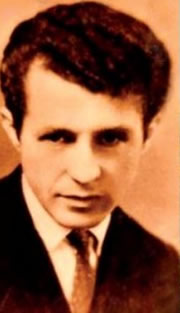
Bilal Xhaferri (2 november 1935 – 14 oktober 1986)
De Nederlandse dichteres Augusta Guerdina Peaux werd geboren in Simonshaven op 2 november 1859. Zie ook alle tags voor Augusta Peaux op dit blog en ook mijn blog van 2 november 2010
Zij die de oorlog willen
Nog ieder voorjaar vloog verloren
wijd, overal
de kersenbloesem, 't licht bekoren
van bloesemval
wij zagen 't aan en wachtten 't groeien
tot vruchten rood
uit kwistige overvloed van bloeien,
onverschillig voor leven of dood.
Eerst nu uit overvloed van leven
en uur aan uur
het moordend vonnis wordt geschreven
in bloed en vuur,
eerst nu de bloesem stuift verloren
wijd, overal,
ligt droefenis, als niet te voren,
in bloesemval.
Zij zien het aan, zij wachten zege
die groeit zo rood
uit vrucht die rijpt en bloesemregen,
onverschillig voor leven of dood.
Treurnis
In de lente met het eerste groen
is mijn leed geboren
nu geven de bladeren schaduw en doen hun ruisen horen
en mijn leed leeft sterker als toen
en het zal niet welken met het welkend lover,
het gaat niet over
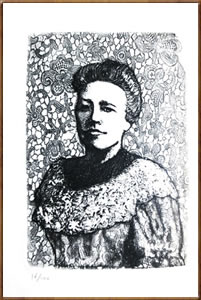
Augusta Peaux (2 november 1859 - 23 februari 1944)
Ets van Will Landman
De Oostenrijkse schrijver Leo Perutz werd geboren op 2 november 1882 in Praag. Zie ook mijn blog van 2 november 2010 en eveneens alle tags voor Leo Perutz op dit blog.
Uit:Zwischen neun und neun
“Die Greislerin in der Wiesengasse, Frau Johanna Püchl, trat an diesem Morgen gegen halb acht Uhr aus dem Laden auf die Straße. Es war kein schöner Tag. Die Luft war feucht und kühl, der Himmel bewölkt. Das richtige Wetter, um sich einen kleinen Schnaps zu vergönnen. Aber Frau Püchls Slivovitzflasche, die im Kasten stand, war beinahe geleert und die Greislerin beschloß, den kleinen Rest, der kaum ein »Stamperl« zu füllen vermochte, für die »Zehnerjausen« aufzusparen. Vorsichtshalber versperrte sie die Flasche in den Küchenschrank, denn ihr Ehegatte, der im Lichthof den zerbrochenen Greislerkarren reparierte, stimmte mit ihr in der Wertschätzung eines guten Schnapses völlig überein.
Vor acht Uhr kamen nur ein paar Stammkunden: Der Friseurgehilfe, dem sie allmorgendlich sein Frühstück, ein Butterbrot mit Schnittlauch und ein Büschel Radieschen, zurechtmachte. Zwei Schulkinder, die um zwölf Heller »saure Zuckerln« kauften. Die Köchin der Frau Inspektor aus dem ersten Stock des Elferhauses, die ein Häuptel Salat und zwei Kilo Erdäpfel bekam, und der Herr aus dem Arbeitsministerium, der seit Jahren täglich einen »feinen Aufschnitt« für sein zweites Frühstück im Geschäfte der Frau Püchl erstand.
Lebhaft wurde das Geschäft erst nach acht Uhr und gegen halb neun hatte Frau Püchl alle Hände voll zu tun. Kurz nach neun Uhr erschien die alte Frau Schimek, der die Ecktrafik in der Karl-Denk-Gasse gehörte, zu einem längeren Plausch."
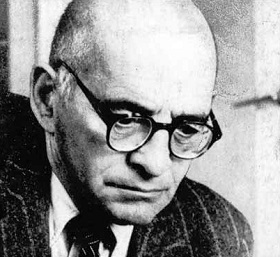
Leo Perutz (2 november 1882 – 25 augustus 1957)
De Franse schrijver en moralist Jules Amédée Barbey d'Aurevilly werd geboren op 2 november 1808 in Saint-Sauveur-le-Vicomte (Manche). Zie ook alle tags voor Jules Barbey d'Aurevilly op dit blog en ook mijn blog van 2 november 2010
Uit: Le Chevalier des Touches
« Ce soir-là, comme à l'ordinaire, ces routinières de l'amitié avaient dans leur salon une de leurs amies, noble comme elles, qui travaillait à la plus extravagante tapisserie avec une telle action qu'elle semblait se ruer à ce travail, suspendu tout à coup par l'arrivée de son frère, l'abbé. Fée plus mâle, aux traits plus hardis, à la voix plus forte, celle-ci tranchait par la brusquerie hommasse de toute sa personne sur la délicatesse et l'inertie de ces douces Contemplatives, de ces deux vieilles chattes blanches de la rêverie sans idées, qui n'avaient jamais été des Chattes Merveilleuses. Ces pauvres vierges de Touffedelys avaient eu le suave éclat de leur nom dans leur jeunesse; mais elles avaient vu fondre leur beauté au feu des souffrances, comme le cierge voit fondre sa cire sur le pied d'argent du chandelier.
A la lettre, elles étaient fondues... tandis que leur amie, robustement et rébarbativement laide, avait résisté. Solide de laideur, elle avait reçu le soufflet, l'alipan du Temps, comme elle disait, sur un bronze que rien ne pouvait entamer. Même la mise inouïe dans laquelle elle encadrait[15] sa laideur bizarre n'en augmentait pas de beaucoup l'effet, tant l'effet en était frappant! Coiffée habituellement d'une espèce de baril de soie orange et violette, qui aurait défié par sa forme la plus audacieuse fantaisie et qu'elle fabriquait de ses propres mains, cette contemporaine de mesdemoiselles de Touffedelys ressemblait, avec son nez recourbé comme un sabre oriental dans son fourreau grenu de maroquin rouge, à la reine de Saba, interprétée par un Callot chinois, surexcité par l'opium. Elle avait réussi à diminuer la laideur de son frère, et à faire passer le visage de l'abbé pour un visage comme un autre, quoique, certes! il ne le fut pas. Cette femme avait un grotesque si supérieur qu'on l'eût remarquée même en Angleterre, ce pays des grotesques, où le spleen, l'excentricité, la richesse et le gin travaillent perpétuellement à faire un carnaval de figures auprès desquelles les masques du carnaval de Venise ne seraient que du carton vulgairement badigeonné."
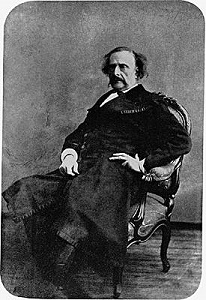
Jules Barbey d'Aurevilly (2 november 1808 – 23 april 1889)
De Russische dichter, schrijver en Christelijk mysticus Daniil Leonidovich Andreyev werd geboren op 2 november 1906 in Berlijn. Zie ook alle tags voor Daniil Andreyev op dit blog en ook mijn blog van 2 november 2010
Uit: The Rose of the World
“One of them aims for the hypertrophy of state power and an increase in the individual's dependence on the state. To be more exact, this movement seeks to bestow ever greater power on the person or organization in whose hands the state apparatus lies: the Party, the Army, the Leader. Fascist and national socialist states are the most obvious examples of such movements.
The other movement, which appeared at least as far back as the eighteenth century, is the humanist. Its origins and major stages are English parliamentarianism, the French Declaration of the Rights of Man, German social democracy, and in our days, the struggle for liberation from colonialism. The long-range goal of the movement is to weaken the bonding principle of coercion in the life of the people and transform what is largely a police state defending race or class interests into a system based on overall economic equilibrium and a guarantee of individual rights.
History has also witnessed examples of novel political arrangements that might appear to be hybrids of the two movements. Remaining in essence phenomena of the first type, they alter their appearance to the extent expedient for the achievement of their set goal. This is a tactic, a deception, but nothing more.
Nevertheless, despite the polarity of these movements, they are linked by one trait characteristic of the twentieth century: global ambitions. The ostensible motivation of the various twentieth century movements can be found in their political blueprints, but the underlying motivation in modern history is the instinctive pursuit of global dominion.
The most vigorous movement of the first half of this century was distinguished by its internationalist doctrines and global appeal. The Achilles heel of the movements vying with it—racism, national socialism—was their narrow nationalism, or to be more exact, the strictly racial or nationalist fences around their promised lands, the chimera of which they used to seduce and dazzle their followers. But they too strove for world dominion, and invested colossal energy toward that end. Now American cosmopolitanism is occupied with avoiding the mistakes of its predecessors. »
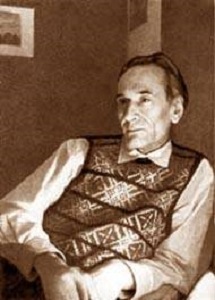
Daniil Andreyev (2 november 1906 – 30 maart 1959)
In 1958
|



